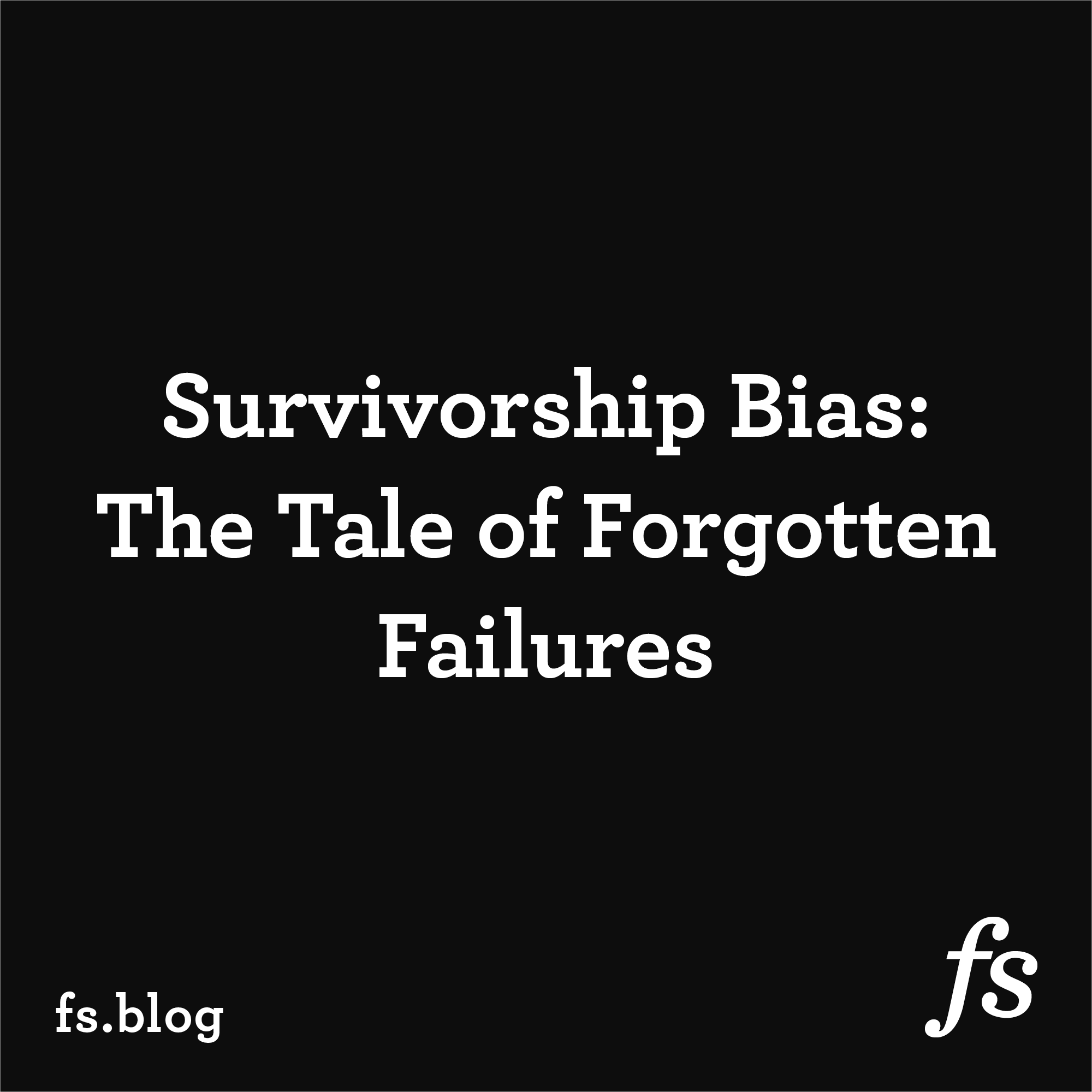5fish
Well-Known Member
- Joined
- Jul 28, 2019
- Messages
- 10,711
- Reaction score
- 4,559
This is a problem we have in live.... I think @O' Be Joyful , @rittmeister , @jgoodguy ,@Leftyhunter , @Wehrkraftzersetzer

 fs.blog
fs.blog
snip...
Survivorship bias is a common logical error that distorts our understanding of the world. It happens when we assume that success tells the whole story and when we don’t adequately consider past failures.
There are thousands, even tens of thousands of failures for every big success in the world. But stories of failure are not as sexy as stories of triumph, so they rarely get covered and shared. As we consume one story of success after another, we forget the base rates and overestimate the odds of real success.
snip...
When we only pay attention to those who survive, we fail to account for base rates and end up misunderstanding how selection processes actually work. The base rate is the probability of a given result we can expect from a sample, expressed as a percentage. If you play roulette, for example, you can be expected to win one out of 38 games, or 2.63%, which is the base rate. The problem arises when we mistake the winners for the rule and not the exception. People like Gates, Lamichhane, and the Beatles are anomalies at one end of a distribution curve. While there is much to learn from them, it would be a mistake to expect the same results from doing the same things.
snip...
Few would think to write the biography of a business person who goes bankrupt and spends their entire life in debt. Or a musician who tried again and again to get signed and was ignored by record labels. Or of someone who dreams of becoming an actor, moves to LA, and ends up returning a year later, defeated and broke. After all, who wants to hear that? We want the encouragement survivorship bias provides, and the subsequent belief in our own capabilities. The result is an inflated idea of how many people become successful.
snip...
Survivorship bias is particularly common in the world of business. Companies which fail early on are ignored, while the rare successes are lauded for decades. Studies of market performance often exclude companies which collapse. This can distort statistics and make success seem more probable than it truly is. Just as history is written by the winners, so is much of our knowledge about business. Those who end up broke and chastened lack a real voice. They may be blamed for their failures by those who ignore the role coincidence plays in the upward trajectories of the successful
snip... WW2
However, Wald realized there was a missing, yet valuable, source of evidence: Planes that were hit that did not make it back. Planes that went down, that weren’t surviving, had much better information to provide on areas that were most important to reinforce. Wald’s approach is an example of how to overcome survivorship bias. Don’t look just at what you can see. Consider all the things that started on the same path but didn’t make it. Try to figure out their story, as there is as much, if not more, to be learned from failure.

Survivorship Bias: The Tale of Forgotten Failures
Survivorship bias is a common logical error that distorts our understanding of the world. It happens when we assume that success tells the whole story and when we don’t adequately consider past failures.
 fs.blog
fs.blog
snip...
Survivorship bias is a common logical error that distorts our understanding of the world. It happens when we assume that success tells the whole story and when we don’t adequately consider past failures.
There are thousands, even tens of thousands of failures for every big success in the world. But stories of failure are not as sexy as stories of triumph, so they rarely get covered and shared. As we consume one story of success after another, we forget the base rates and overestimate the odds of real success.
snip...
When we only pay attention to those who survive, we fail to account for base rates and end up misunderstanding how selection processes actually work. The base rate is the probability of a given result we can expect from a sample, expressed as a percentage. If you play roulette, for example, you can be expected to win one out of 38 games, or 2.63%, which is the base rate. The problem arises when we mistake the winners for the rule and not the exception. People like Gates, Lamichhane, and the Beatles are anomalies at one end of a distribution curve. While there is much to learn from them, it would be a mistake to expect the same results from doing the same things.
snip...
Few would think to write the biography of a business person who goes bankrupt and spends their entire life in debt. Or a musician who tried again and again to get signed and was ignored by record labels. Or of someone who dreams of becoming an actor, moves to LA, and ends up returning a year later, defeated and broke. After all, who wants to hear that? We want the encouragement survivorship bias provides, and the subsequent belief in our own capabilities. The result is an inflated idea of how many people become successful.
snip...
Survivorship bias is particularly common in the world of business. Companies which fail early on are ignored, while the rare successes are lauded for decades. Studies of market performance often exclude companies which collapse. This can distort statistics and make success seem more probable than it truly is. Just as history is written by the winners, so is much of our knowledge about business. Those who end up broke and chastened lack a real voice. They may be blamed for their failures by those who ignore the role coincidence plays in the upward trajectories of the successful
snip... WW2
However, Wald realized there was a missing, yet valuable, source of evidence: Planes that were hit that did not make it back. Planes that went down, that weren’t surviving, had much better information to provide on areas that were most important to reinforce. Wald’s approach is an example of how to overcome survivorship bias. Don’t look just at what you can see. Consider all the things that started on the same path but didn’t make it. Try to figure out their story, as there is as much, if not more, to be learned from failure.







